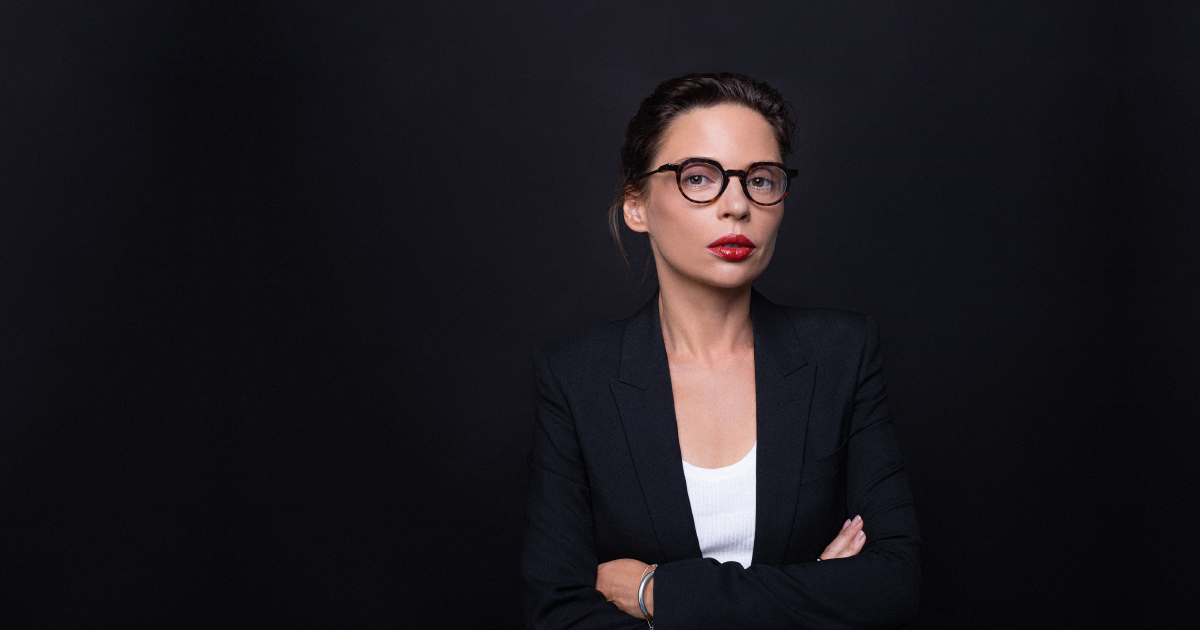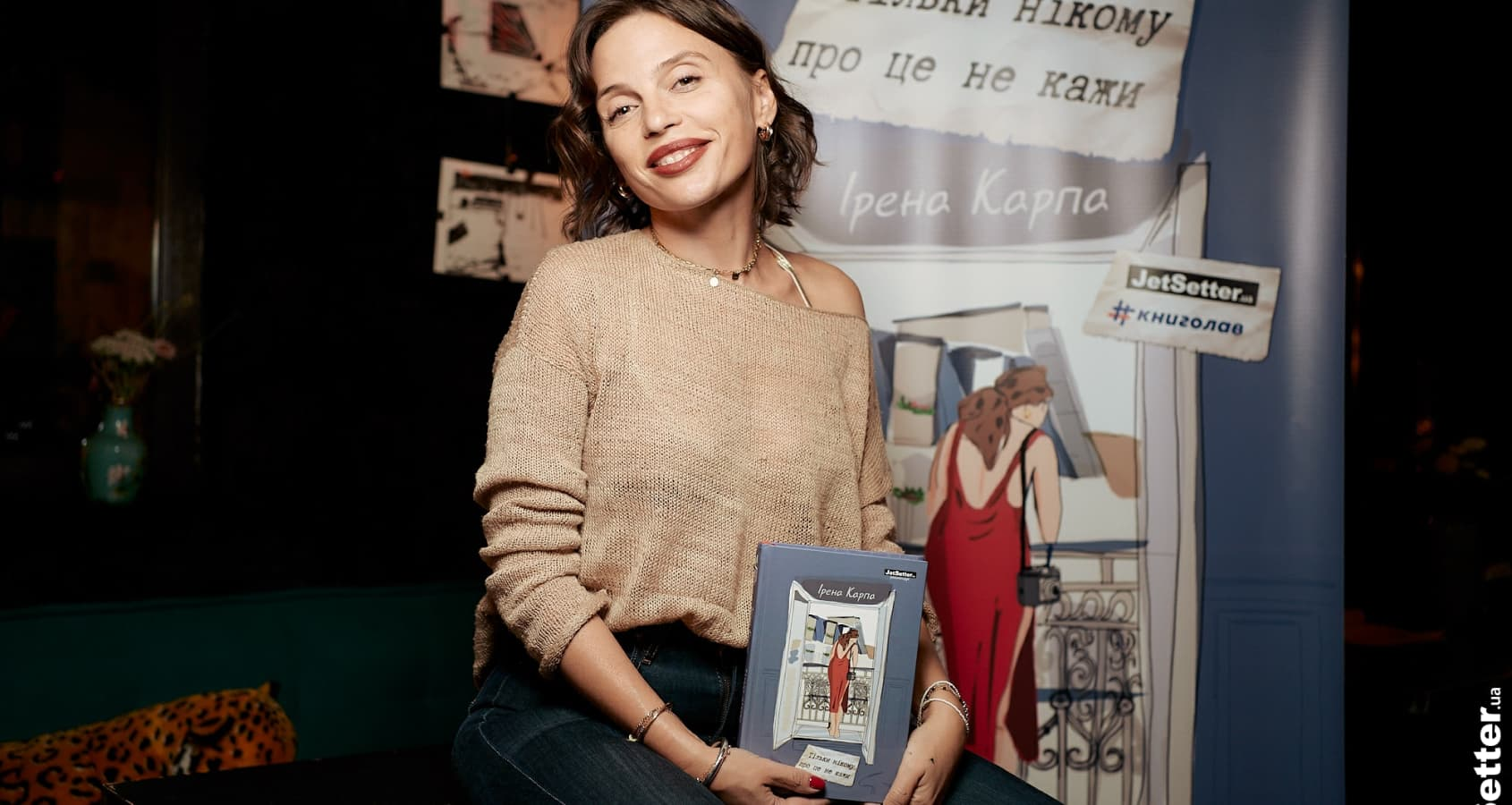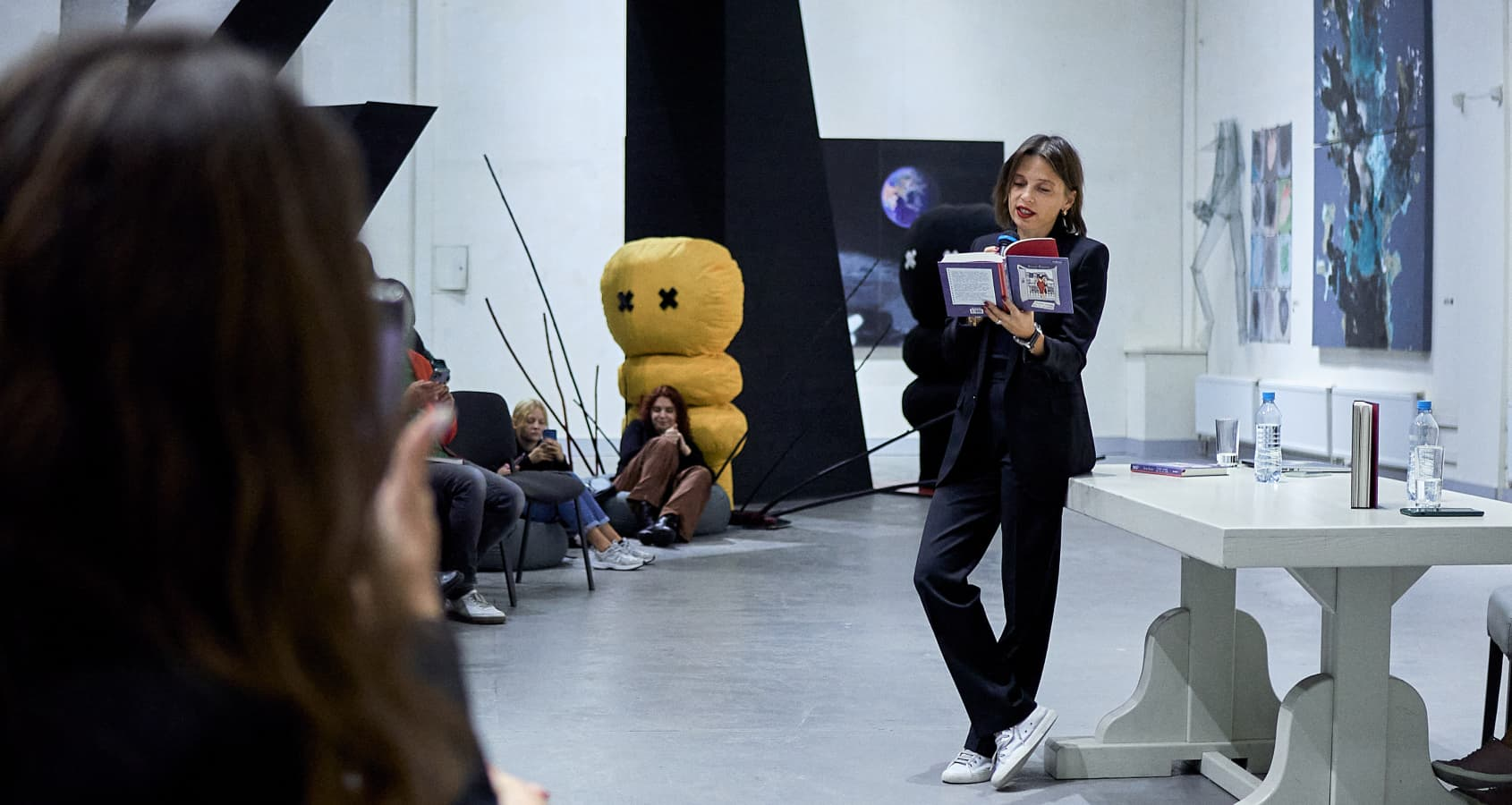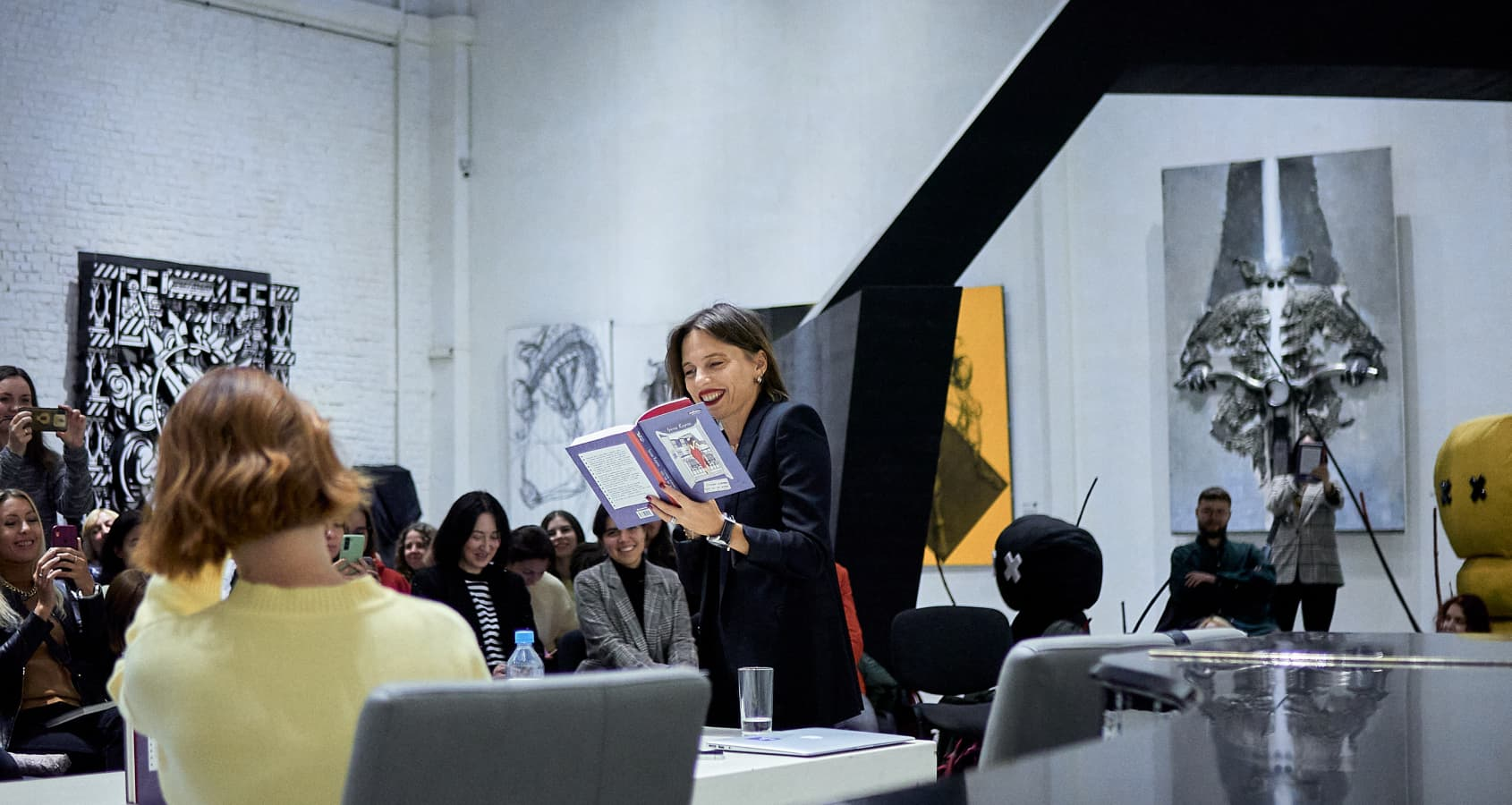Irena Karpa: "We will only communicate and sit at the same table with the Russians when the war ends on Ukraine's terms."

Irena Karpa is a writer, singer, and cultural diplomat of Ukraine in France. Her new novel, "Just Don't Tell Anyone About It," about domestic violence, rape, and bullying, has recently been released by the publishing house "Knyholav."
Svidomi talked to the writer about literature during the war, her new book, communication about the war with the French, and participation in joint events with the Russians.
Did you feel disappointed in the profession when the full-scale invasion began?
I think the feeling of helplessness has affected almost every profession. There was a moment of fear and panic initially, but then we pulled ourselves together and started to do what we were good at. I have courses in therapeutic writing and book writing. I can create it, sell it, and make donations.
In addition, the word is not a weak tool — you can be part of the information defense. However, sometimes it leads to helplessness, a rather insidious feeling that entails guilt.
Over the past years, we have been ordinary heroes in ordinary circumstances: going to work, cooking, planning vacations, and traveling. It is still us, but events have already become extraordinary, and we cannot always influence them. The challenge is to regain control in our small territory and not to get lost in the scale of events.
We can't help everyone in all directions. One person cannot save animals, children, and the military. But that doesn't mean you have to give up. On the contrary, as soon as you determine your direction, it becomes more manageable, and the feeling of helplessness disappears.
One of our tasks is to recover control over ourselves and preserve our mental health. The destabilization of society is one of the enemy's goals. It is challenging to defeat people who are focused, concentrated, and everyone understands their task.
How would you describe your role as a writer during the war?
We live in cruel times when life reminds us of love, pain, and death. The role of the writer is to talk about these feelings subtly. My book "Just Don't Tell Anyone About It," written before the full-scale war, is about the silence of victims of violence.
The name itself is what a person hears: society says it's embarrassing, you're guilty. This topic is sensitive, but I presented it as a psychological detective-thriller, an exciting story, not a documentary presentation with details. A writer is not a journalist; they do not document reality but explain its nature and look deeper.
I doubted whether the book was relevant, but I kept going over it: "After Auschwitz, there is no poetry. After Bucha, there is no prose". I was advised to rewrite it in a military context — to ensure that events unfolded during the war, not the pandemic. But if I took away the context of the pandemic and added more life, my characters would be cynical to continue living as they had before the war.
At the same time, it was an awful feeling that if I added the events in Bucha, it would be an art in the blood, which would work abroad because foreigners are only interested in things for sale.
Talking to human rights activists about the phrase "just don't tell anyone about it," I was sure that the book was relevant. People subjected to violence by the Russian military are reluctant to discuss it. The book "Just Don't Tell Anyone About It" should raise the issue of sexual violence in Ukrainian society. If I succeed, it will be clear why I wrote it.

Do you plan to write a book about the current stage of the Russian-Ukrainian war, and if so, what are its preliminary ideas and concepts?
I've already started. In the center of the plot is a love story of people who have never seen each other, but the war bonds them. It's a story of a volunteer and a soldier. It remains to be seen whether they will ever meet. The stories of secondary characters transforming during the war surround the main plot. For example, a wife who is evacuated abroad with a child and her toxic husband in Kyiv who demands her to return, claiming that it would be better if they were together — to die but to be together despite everything. It will enhance the main storyline and tell how people will indirectly influence the lovers' fate.
Despite the horrors of war, I need to show and reveal the real deep feelings we might think we are not even capable of experiencing.
Is there a particular way of experiencing love during the war?
It is a strong feeling, which makes the circumstances matter. During the war, everything escalates; it becomes almost transparent. The impression was that everyone had a protective film that the war had torn off. And then it became clear what was real and what wasn't.
In love, as in friendship, the stakes are high now. If your beloved is at war, you understand that they could die any day. Therefore, every time you say "bye, good night," it is essential to tell the person everything so as not to regret it later.
It's like a bare nerve, a clear understanding that you live here and now because there may not be tomorrow. The illusion that we will live forever disappears: we will manage, tell, and go someday.
Another topic that interests me is forgetting heroes and the issue of the integration of the military into civilian life after the war. Now, for us, the Ukrainian Armed Forces are gods. But the military themselves worry that when the war is over, they will be forgotten and have to prove who they are.
There are many integrations of Ukrainian culture into the Western academic system: they introduce Ukrainian statehood courses and add Ukrainian works to world literature in universities. In your opinion, is it fashion, or will it have a sustainable effect?
We must keep this level of interest. The request is to come from the inside, and we can't impose such things. I want the popularity of Russia to fall. Mass culture is the best guide in this matter. In particular, my approach to literature manifests it. I explain complex things in a simple form. I called the book a thriller detective rather than began to reflect in treatises on hundreds of pages, analyzing the reasons for the silence of victims of violence.
What is the interest of the French in Ukraine today? And do they understand that the war can also take place in France?
They don't believe the war can reach France; they think we are scaring them. Everyone needs to understand that we all live in war. It is neither a conflict between Russia and Ukraine nor a crisis in Ukraine, but the entire world is at war.
We need to tighten our belts because the era of serenity ended on February 24, 2022. We cannot live as if there is no war. Of course, you have the right to rest, drink coffee, and enjoy the moment, but you also have to do something for our victory. The French understand this and are ready to accept that a comfortable life may not be available.

What is the most challenging thing to explain to the French?
To debunk myths, to explain why we need to supply more weapons and what the difference is between peace and victory. As for myths, it is essential to debunk what they believe in — mostly it is the so-called "good Russians." So it is necessary to be prepared for this from A to Z, calmly, without hysteria, to tell what to do.
What do you think is the reason for the French sentiment towards Russia?
Many years of investing money in the promotion of Russia. The French exalted the "great" Russian theatre, ballet, literature, and even the soul for centuries.
There is also a stereotype about human losses during the Second World War. We must remember that it was the Soviet Union with 15 republics, and the Ukrainians were the ones who died the most in the Second World War.
The French would never have been interested in Ukraine had it not been for the Russian-Ukrainian war.
So now the main thing is to destroy once and for all the myth of a "great" Russia with a noble bear who walks with a tambourine everywhere and quotes Dostoevsky, as well as to show our culture.
Our army and the civil resistance struck the French, and they understood this because they had a great history of the resistance movement during the Second World War. Therefore, it is necessary to point out this similarity more often.
You receive invitations to events in France. How do you determine your participation if there are Russians within the scope of the event?
I do not participate in such events as a matter of principle. I had a scandal with one German show, where there was a Belarusian writer, a "dissident," in their opinion. I hadn't been warned. When packing my suitcase, I learned they were planning to include a Russian author, "a good one, because he had been opposing Putin for many years." Then I asked them politely to separate us into different show episodes. They chose the former between the "good Russian" and me, and we said goodbye forever.
We will only communicate and sit down at the same table with Russians when the war ends on Ukraine's terms: the liberation of all territories, return of all prisoners of war and deportees, payment of reparations, as well as punishment of all criminals. As Oksana Zabuzhko says: "we need quarantine from all Russians."
Russians exist beyond my scope of interest, and I do not want to talk to them. I do not believe their society can do what we have been asking them to do since 2014. Russia will not wake up; it is drunk with blood and lies snoring. Russian intellectuals failed to awaken and lead society because they did only something small around them. And that's our main difference — intellectuals can be political leaders of the community and public opinion.
It is always good to integrate into large cultural sites because this is a particular focus and highlight of everything Ukrainian. But we must achieve it without dialogue with the Russians. We don't need them; they don't exist for us now.



